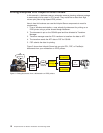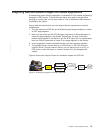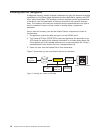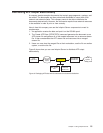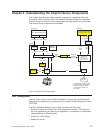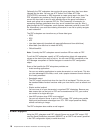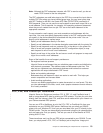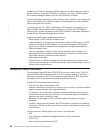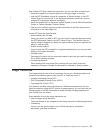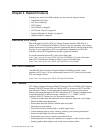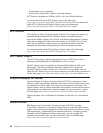
transform and Transform Manager together determine the data stream and call the
correct transform. Image print transform is already a part of your OS/400 system,
but Transform Manager comes only with Infoprint Server for iSeries.
Transform Manager specifies how many transform jobs to initialize upon startup and
when a new transform job should be started. It also specifies how many transform
jobs of each type can be active.
In order to use the PCL, PDF, or PostScript to AFP transform, you need a 5.1 or
higher OS/400, with the PASE feature installed. If you issue the STRTFMMGR
command on a system that does not have PASE installed, a diagnostic message is
issued and the Transform Manager does not start.
Some of the benefits these transforms provide are:
v IPDS support for ERP and ISV software output
These transforms let you print the most common types of ASCII output on IPDS
printers. By printing on IPDS printers, you can take advantage of high speed,
higher service levels, enterprise-class management, and guaranteed delivery.
v Reduce hardware costs
You can consolidate printing on faster iSeries attached printers instead of an
uncontrolled network of personal and LAN printers. Personal and LAN printers
have higher operating costs than iSeries printers.
v Reduce personnel costs
Infoprint Server on iSeries manages the printing and gives you a single control
point for print management across the enterprise. These transforms give you the
ability to fully manage printing.
Create AFP Data Command
The command Create AFP Data (CRTAFPDTA) lets you convert a line (*LINE) or
mixed (*AFPDSLINE) data spooled file to AFP for printing, viewing, or archiving. It
also lets you convert an AFP file that references resources to an AFP stream file
packaged with all of the resources needed for printing or viewing.
Create AFP Data performs these functions:
v Converts line data or mixed data to AFP.
v Indexes a document to enhance your ability to view, archive, or retrieve individual
pages or groups of pages from large documents.
For example, you could index a customer statement application using account
numbers and names, then you could view or retrieve one customer’s statement
based on the name or account number.
v Retrieves and packages all AFP resources needed for printing or viewing a
document.
v Creates a merged file that contains the AFP document, resources, and indexing
information. This file can then be archived or used on other systems without loss
of information.
You can input the following types of print data to this command:
v AFP
v Line (externally formatted with page definitions and form definitions)
v S/370
™
line
v Mixed mode (line combined with AFP)
20 Infoprint Server for iSeries: Introduction and Planning Guide
|
|
|
|



